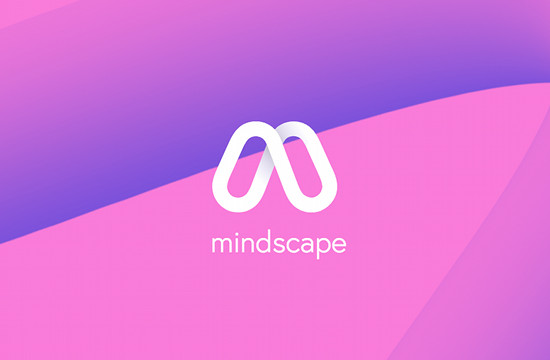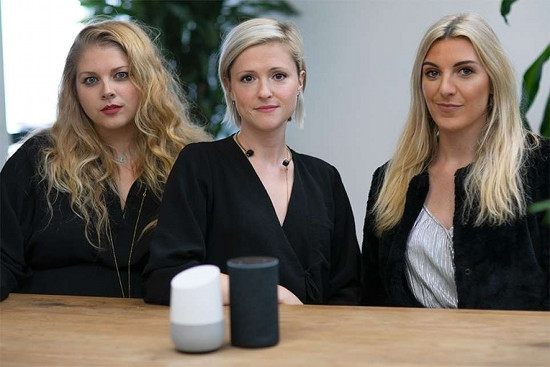
Your Shot: The App That’s Fusing AI with Neuroscience to Help Anxiety Sufferers

A public opinion poll from the American Psychiatric Association in March of this year revealed that 39% of Americans reported feeling more anxious now than they did one year before. Another 39% reported feeling similar levels of anxiety, while only 19% felt less anxious and 3% were unsure. The story is similar in the UK. Research by the UK Council of Psychotherapy, released in October 2017, showed that rates of “moderate to extreme anxiety and depression” among employed had risen by 30.5% since records began four years earlier.
A new voice app, created by London agency CULT in collaboration with MassiveMusic, is looking to help people cope better with anxiety and offer front-line support to those suffering a panic attack. Entitled Mindscape, it combines voice technology, AI and neuroscience-based music therapy, and is available to download for free for Amazon Alexa and Google Home (download the Google Assistant app if you’d like to use through your phone). It was created with mental health charity Mind and marks the first project for CULT’s newly launched innovation lab CULT Experiment.
LBB’s Addison Capper spoke with Cat Turner, chief creative officer and founder of CULT, and Aifric Lennon, music/mind researcher at MassiveMusic, to find out more about the foundations of Mindscape, the power of voice technology, and how neuroscience and music come together to aid our brains.
LBB> This is the first product created by CULT Experiment - how did you find the experience of creating in that way?
Cat> As with anything new, you make a lot of mistakes, fail fast and bust a lot of balls. This was no exception, but it was also our intention; we wanted to learn on the job. Bridey[-Rae Lipscombe, co-founder of CULT,] and I started CULT six years ago with virtually zero experience; we're used to rolling with the punches. CULT Experiment is intended to drive in-house learning, so it was always going to be a partially painful process, but like all the best things in life, the rewards made it 100% worthwhile.
LBB> What were the foundations of this project? Did Mind come to you with a brief or did you approach them with the idea? What inspired you to make it?
Cat> The foundation of this project was three-fold. In the beginning, it was simply, that we wanted to develop something using voice tech. The next stage was that we were seeing successive research papers, stats and articles on the increase of depression and anxiety, particularly in young people. And finally, Jen Heapem who was then an ACD at Cult, had an idea to guide people through an anxiety attack using voice technology to calm them down. These three things combined to create the vision for Mindscape. We approached Mind with the idea, they loved it and the team at Mind in Haringey (which reports some of the highest levels of depression and anxiety in the UK) came on board to assist us with research, refining the full product and endorsing the results.
LBB> Why is something like Mindscape so important to today?
Cat> These days we all rely heavily on digital to enhance our lives; we're constantly connected. Voice allows us to still have the benefits of technology but without screen-time - this is very important, as it’s proven that time-out from the blue screen helps to reduce anxiety. Mindscape is pushing the limits for the current use of voice; it’s tailored to support users in specific scenarios. Why is this important? We believe that technology can be a source for good and in developing Mindscape, CULT Experiment has shown what’s possible, it’s about social responsibility.
LBB> Aifric, what were your initial thoughts when Cult first approached you with this project?
Aifric> We were very excited when Cult first approached us - there are a few reasons why. Firstly, it represented an opportunity for us to further develop our Music x Mind initiative, which MassiveMusic began last March. The initiative is focused on using our platform to make some noise on the topic of mental health. We have been writing articles and running roundtables and talks, but Mindscape marks one of the first projects we have undertaken that is a tangible musical response to the issue of mental health. Secondly, it is always exciting for us to collaborate with experts in related fields, and this project really has been a meeting of minds across the fields of voice, AI, psychology, technology and music.

Left to right: Cat Turner, Jen Heape and Aifric Lennon
LBB> What kind of research went into this project? There are so many elements and intricacies…
Cat> A huge amount of research and substantiation went into Mindscape, not only at the front end of the project, but throughout. This was pioneered by Jen Heape, who immersed herself in the subject, liaised with Mind Haringey and collaborated on the sound portion with MassiveMusic and Aifric, who worked hard to ensure the sound elements had a science-based input to ensure a therapeutic outcome for users.
Aifric> We spent months delving into academic research papers in order to learn best practice for composing music aimed at alleviating anxiety. This was hugely insightful for us. There is a growing level of emerging academic research which indicates the benefits of various compositional techniques, and we compiled these findings in order to write our music brief for Mindscape.
LBB> Aifric, your composition was interlinked with scientific facts - how did you find that experience and how did it alter your creative approach?
Aifric> Yes, all of the compositions were designed using scientifically proven methods aimed at alleviating various mental states. For the sleep track, we composed a track that gradually decreases in tempo from 70 BPM to 50 BPM, and we explored various keys and melodic motifs proven to calm listeners. This definitely pushed our brief to a much more prescriptive area, however we made sure that what we composed did not lack creativity.
LBB> This isn’t really music for brand either, it has a different aim - did that affect your approach to this project at all?
Aifric> We approached this project with the same goals, aims and enthusiasm as with our brand work. I guess what’s different is the outcome - in that we have created something that will hopefully make a tangible difference to people’s lives. There’s something very special about working on a project like that.
LBB> Outside of Mindscape, how useful is music in coping with mental health?
Aifric> At MassiveMusic we are firm believers in the power of sound and music to maintain one’s mental health. We are not so much promoting it as a treatment, however we are fully aware of its myriad benefits in maintaining mental health. Simple tasks such as listening to the right music first thing in the morning has the power to gradually ease you into the day. Our bodies are programmed to immediately enter ‘fight or flight’ mode at the beginning of the day, and the sound of our alarm each morning can be a jarring, unwelcome start. While we need a certain amount of adrenaline to kick-start our system, listening to music that makes you feel happy and relaxed can bring a more positive start to the day, instead of letting your alarm dictate your morning mood.
LBB> It’s quite widely reported that mental health issues such as anxiety are on the rise - what do you think are the biggest causes of that?
Cat> Honestly, I’m not sufficiently qualified to answer this. Mental health is deeply personal and individual and should be treated with respect and patience. At CULT we do all we can to support our staff, it’s paramount to us that no person struggles in silence. As such, we provide all of CULT’s family with weekly in-office counselling sessions through Sanctus and we make it a priority that as a group we take time to pamper and indulge together (in-house treatments) and socialise together. Mindscape is another step for CULT to show those who work for us that mental health is a really important subject for us as an agency and that Bridey and I will do all we can to support those who work for us, and via Mindscape, give back to the world externally.
Aifric> I think this is a question which is coming up again and again, and it is a difficult one to speculatively answer. Working with Mind on this project really opened our eyes to the number of people suffering with anxiety at the moment, and the broad list of reasons this might be the case. It’s important to note that while there has been a definite rise in levels of anxiety amongst society, what we are seeing now is an increase in resources and a lowering of stigma attached to mental health issues, which is a positive thing.
LBB> One hang up could be that people aren’t so comfortable interacting with the voice aspect - was that a concern at all? How have you addressed that?
Cat> Of course. Many people remain very wary of voice devices in the home. Despite this being a consideration for us, it didn't deter. We know 10% of UK and 20% of US homes have some form of voice device and while this isn't as big as the smartphone, the uptake is faster than that of the television. We know there will naturally be those hesitant to embrace new technology and while a consideration, this shouldn’t stop pioneering work - which is the mission of CULT Experiment.
LBB> What kind of reaction have you seen since launch?
Cat> We've had a hugely positive response. We know that there remains a bit of a reality jump for some people to get their head around the concept, but it has so far been embraced.
LBB> Any parting thoughts?
Aifric> What I have learned is that it is entirely possible to do something tangible and real as a business to combat the issue of poor mental health, and I have been lucky enough to work with people who can make that goal a reality. I would encourage anyone who’s interested in getting involved to reach out to relevant organisations, charities and explore how you can use your platform to either raise awareness or do something tangible. My final parting thought is to check out Mindscape, available now on Google Home and Alexa, and contact either CULT or ourselves at MassiveMusic with any questions you might have relating to the platform.













